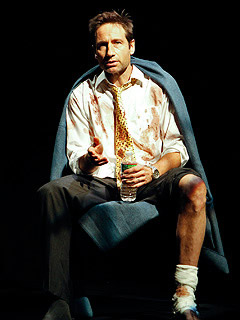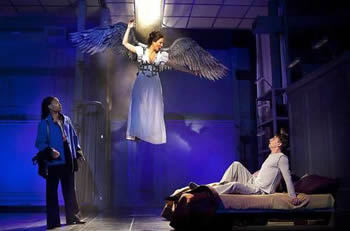HotReview.org Editor's
Picks
Shows Worth Seeing:

Break of Noon
By Neil LaBute
Lucille Lortel Theatre
Box office: (212) 279-4200
Neil LaBute is not a delver.
He made that clear long ago, so anyone who goes to his plays seeking
exploration of psychological depths or social etiologies has not
been paying attention. LaBute is a describer, and a good one at
that. He is fascinated by surfaces, particularly the surface appearance
of bad, obnoxious behavior, and his best work makes that behavior
into a sort of Rorschach test that measures others’ relationships
to superficiality. By this standard, Break of Noon is
a very good LaBute play—sleek and punchy in its dance of
appalling facades but also bound to frustrate and irritate all
who crave dramas of in-depth exploration.
David Duchovny—whose
flat TV affect is perfect for this assignment—plays the
sole survivor of a mass-killing incident in which a disgruntled
employee guns down people at his workplace. Afterward the Duchovny
character claims that God spoke to him in the midst of the horror,
singling him out for survival so he could spread the word that
people should “you know, be good.” He has no particular
insight into goodness and no talent for making people believe
anything he says. In fact, he seems to have treated everyone around
him awfully in the past. On top of that, he managed to snap a
smart-phone-photo of the killer during the crime that he sold
for a million bucks. The drama consists of scenes in which various
characters who think this guy is full of baloney explain what
they do believe by revealing their different expectations of him.
His lawyer, for instance, only wants to provide savvy management
for his newfound celebrity, his ex-wife only wants him to show
real remorse for the past, and a detective only wants him to come
clean about why the killer really let him live.
What no one is willing to
embrace is the idea that this superficial, inarticulate, utterly
unremarkable man may have had a real religious experience. By
definition, that can’t be “proven” to others,
and its unprovability impinges on all their cynical or secular
assumptions about the world. Everyone in the play is bent on resolving
the guy’s experience into some category they are already
familiar and comfortable with, but LaBute won't validate their
claims, or even judge them. In his snappy and efficient way, he
just presents the surface facts of claim and reaction, showing
us a world of people who really are happy to react to surfaces,
for the most part, rather than probing beneath them or confronting
anything outside their ken. It’s up to us to judge them
if we want, as representatives of a remarkably ugly world that
he describes chillingly well.
-----------------------------------

Angels in America: A Gay Fantasia on National Themes
By Tony Kushner
Signature Theatre
555 W. 42nd St.
Box office: (212) 244-PLAY
Angels in America,
Tony Kushner’s groundbreaking seven-hour epic about American
identity viewed through the eyes of gays in the grip of the early
AIDS crisis, took Broadway by storm in 1993, riding an intense
wave of leftist relief following Bill Clinton’s election.
Perhaps the greatest pleasure of this first New York revival since
then is discovering that the work can still hold an audience rapt
for an entire afternoon and evening despite the fact that that
wave (and another one like it) has long since crested and broken.
How well I remember smiling, outwardly and inwardly, at the daring
impudence and devastating perceptiveness of Angels when
it premiered, flush with admiration at the way it employed the
self-conscious hilarity of gay camp to identify the moral slippages
that had allowed the Reagan revolution to occur. In 2010, however,
I wasn’t sure how the work’s cleverness would hold
up in theatrical terms, and I worried that its earnest hunger
for ecstatic millenarian experience would mean little to audiences
weaned on Bushie cynicism and 9/11-era moral cowardice.
Michael Greif’s production has assuaged most of my doubts.
It is smaller and humbler than George C.Wolfe’s was 17 years
ago, and its resizing for an Off-Broadway house has forced some
interesting re-evaluation of the play’s fantastical elements
(e.g. the angels, ghosts, hallucinations, and flaming Hebrew letters).
These now come off as much more self-consciously artificial than
they did on Broadway, and in this form they’re more thought-provoking
than purely amazing. The audience listens more closely in the
smaller space, and the actors concentrate more on clarity than
on playing big. Angels becomes more of a think-piece,
and its thought doesn’t at all feel time-bound. I admit
that some aspects of the diminished size are disappointing. Frank
Wood’s quotidian portrayal of Roy Cohn, for instance, made
me miss the monstrous enormity of Ron Leibman on Broadway, and
Al Pacino in Mike Nichols’s film. Moreover, the role of
Harper (played here by Zoe Kazan) is still a glaring blemish on
the work, incompletely conceived and singularly unconvincing.
The main point, though, is that Greif’s production proves
Angels’s bona fides as an echt theatrical warhorse,
and as such its occasional blemishes seem moot in performance
(a good performance, that is). Any warhorse of this kind is powered
by a miraculous mechanism at its core: for Kushner this has to
do with his earnest faith in dialectical thought and righteous
campy anger. Fueled in this utterly reliable way, the work clicks
and hums along so efficiently and entertainingly that you just
sit back to enjoy the ride, whatever you might think. You know
within a half hour that your time will not be wasted, since all
the play’s dramatic gambits clearly have strong theatrical
pith from the get-go. Contributing to that feeling are marvelous
performances by Robin Bartlett as Hannah Pitt, Christian Borle
as Prior, and Billy Porter as Belize.
Remarkably, no one in the audience left during the entire seven
hours at the performance I attended, which is more than could
be said about Wolfe’s production, or indeed about any of
the other dozen or so marathon plays that have (curiously) appeared
in New York this year.
